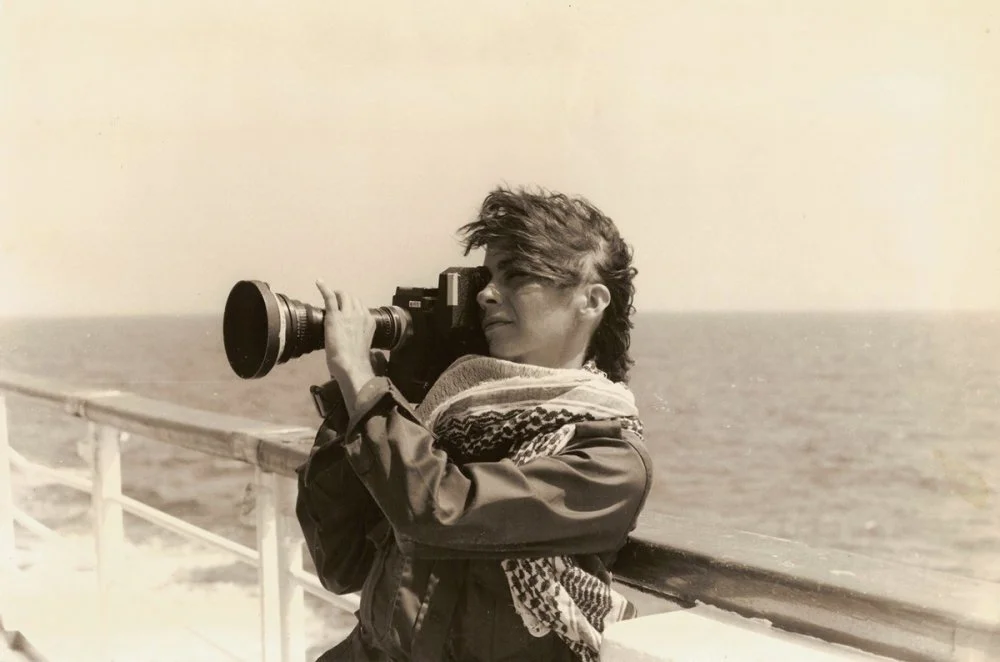The Jocelyne Saab Association
Following the screening of Saab’s Beirut Trilogy at FICUNAM in Mexico City, writer and filmmaker Samuel Harwood spoke with Jinane Mrad about the mission and work of the Jocelyne Saab Association. Jinane Mrad is the Association’s Secretary and Deputy Director of Restoration.
SH: Please tell me a little bit about yourself and the work of the Jocelyne Saab Association.
JM: The Jocelyne Saab Association was founded in February 2019 after Jocelyne's death at the initiative of Nessim Ricardou-Saab, son of the filmmaker, and Mathilde Rouxel, a French film programmer and expert in Arab cinema. She met Jocelyne Saab in 2013 and became a close collaborator of the filmmaker until the end of her life. The Association works towards the valorization, restoration, and broadcast of the work of Jocelyne Saab. It is based in Marseille, but its core activity is in Beirut. Since 2019, several workshops in digitization have been organized and have resulted in the restoration of around fifteen films. It was important for us to develop the restoration activity in Lebanon with Lebanese teams in order to make these films known to the Lebanese people.
SH: What led to the Association's decision to restore the Beirut Trilogy?
JM: The restoration work is a project that Jocelyne Saab intended to carry out during her lifetime. We initiated this process in order to take her will into account, but also to provide access to previously unknown films. Our objective was not to limit our work to only the better-known films, like the Beirut Trilogy, but to deploy Saab's entire filmography throughout its complexity. We carried out this work almost without any financial funding, but we benefited from the support of different initiatives: we collaborated with Mohanad Yaqubi who welcomed us at KASK & Conservatorium in Belgium.
We carried out the first part of the restoration work at the Polygone étoilé in Marseille. The project was also supported by The Post Office in Beirut. Through a partnership with the Cinémathèque Beirut in 2021, we received consultation and mentorship from the Swiss Cinémathèque and the FIAF technical commission on the production restorations. The expertise provided by these partnerships has allowed us to be technically independent today on the entire digital restoration side.
Since 2019, the Association has restored 15 films made in 16 mm between 1974 and 1982, mainly during the Lebanese civil war. A DVD box set was edited in April 2024 by the French company Les Mutins de Pangée and is now available for sale.
For the other films to be restored, which include fiction films, we are continuing our work thanks to the workshops organized in Beirut and other Arab countries, and we hope to be able to show these films in their complete and restored versions by 2025.
SH: I saw the Beirut Trilogy at FICUNAM in Mexico City and would love to know a bit more about their journey. Have the films been shown since their respective premieres on French television in 1976, ’78, and ’82? Where else have they screened since the restoration?
JM: After their broadcast on TV, Beirut Trilogy was best known by the Lebanese diaspora because they circulated in a few festivals where Jocelyne came to present them. In later years, she mainly focused on her more recent work, since she was productive until the last year of her life. Since her death, the Association has made the films available in different languages, which has allowed us to respond to numerous broadcasting requests from all over the world (Switzerland, Mexico, Spain, Portugal, and Quebec, among others) and for very different distribution frameworks, associations, cinemas, festivals, and even plays.
You Might Also Like:
The Beirut Trilogy by Jocelyne Saab

